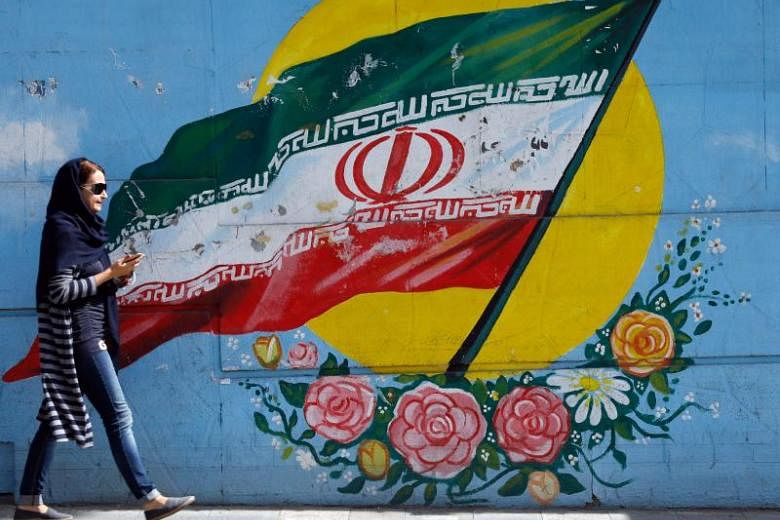TEHERAN (AFP) - Thousands of regime supporters marched in cities across Iran on Saturday (Dec 30) in a show of strength for the regime after two days of protests that marked the biggest unrest for years.
State television showed large crowds of black-clad supporters gathering in the capital Teheran, Iran's second-largest city Mashhad, and elsewhere to mark the anniversary of the end of "the sedition" - the last major unrest that followed disputed elections in 2009.
It was a coincidence that the pre-planned rallies came just after anti-government protests, which had spread from Mashhad on Thursday to numerous towns across the country.
Initially aimed against high prices, the anti-government protests quickly turned against the Islamic regime as a whole.
Videos on social media showed hundreds marching through the holy city of Qom on Friday evening, with people chanting "Death to the dictator" and "Free political prisoners".
There were even chants in favour of the former monarchy toppled by the Islamic revolution of 1979, while others attacked the regime for supporting Palestinians and other regional movements rather than focusing on problems at home.
Footage of large-scale protests were shared from the cities of Rasht, Hamedan, Kermanshah, Qazvin and elsewhere, with police responding with water cannons.
"Alarm signal for everyone," was the headline in reformist newspaper Arman, which called for action on living costs.
The conservative Javan newspaper warned that Iran's "enemies are targeting the system's popular support" and seeking to "create divisions".
While state television focused entirely on the pro-government rallies on Saturday, officials nonetheless warned against dismissing the public anger seen in recent days.
"The country is facing serious challenges with unemployment, high prices, corruption, lack of water, social gap, unbalanced distribution of budget," wrote Mr Hesamoddin Ashena, cultural adviser to President Hassan Rouhani, on Twitter. "People have the right for their voice to be heard."
The US condemned the arrest of protesters, telling Teheran that "the world is watching".
"Many reports of peaceful protests by Iranian citizens fed up with regime's corruption and its squandering of the nation's wealth to fund terrorism abroad," President Donald Trump tweeted late on Friday.
"Iranian govt should respect their people's rights, including right to express themselves," he wrote.
Since the 2009 protests were ruthlessly put down by the Revolutionary Guards, many middle-class Iranians have abandoned hope of pressing for change from the streets.
But low-level strikes and demonstrations have continued, often on a sector-by-sector basis as bus drivers or teachers or workers from specific factories protesting against unpaid wages or poor conditions.
Some of this week's protests were directed against financial scandals linked to unauthorised lending institutions which collapsed with the loss of hundreds of thousands of accounts.
There has also been anger at welfare cuts and fuel price increases in the latest budget announced earlier this month.
Since taking power in 2013, Mr Rouhani has sought to clean up the banking sector and kickstart the economy, but many say progress has been too slow.
Although conservatives have fiercely criticised Mr Rouhani for the country's economic failings, they were already moving on Saturday to distinguish economic protests from wider attacks on the regime.
"The people who are protesting are vigilant and distance themselves from enemies of the system," said Mr Mohsen Rezai, former Revolutionary Guards commander, on his Instagram page.
Ayatollah Alamolhoda, the representative of Ayatollah Khamenei in Mashhad, said a few people had taken advantage of Thursday's protests against rising prices to chant slogans against Iran's role in regional conflicts.
Teheran backs Syrian President Bashar al-Assad in his country's civil war, Shi'ite militias in Iraq, Houthi rebels in Yemen and Lebanon's powerful Hizbollah group.
"Some people had come to express their demands, but suddenly, in a crowd of hundreds, a small group that did not exceed 50 shouted deviant and horrendous slogans such as 'Let go of Palestine', 'Not Gaza, not Lebanon, I'd give my life (only) for Iran'," Ayatollah Alamolhoda said.
Social media videos also showed demonstrators chanting, "Leave Syria, think about us," criticising Iran's military and financial support for Mr Assad.
Vice-President Eshaq Jahangiri, a close Rouhani ally, suggested that hardline conservative opponents of the pragmatist president might have triggered the protests but lost control of them. "Those who are behind such events will burn their own fingers," IRNA quoted Mr Jahangiri as saying.
The Revolutionary Guards, which along with its Basij militia spearheaded a crackdown against the protesters in 2009, said in a statement carried by state media that there were efforts to repeat that year's unrest but added: "The Iranian nation... will not allow the country to be hurt."
Mohsen Nasj Hamadani, deputy security chief in Teheran province, said about 50 people had rallied in a square but most had left after being asked to by police, while a few who refused were "temporarily detained", the ILNA news agency reported.
In the central city of Isfahan, a resident said protesters had joined a rally held by factory workers demanding back-pay.
"The slogans quickly changed from the economy to those against (President Hassan) Rouhani and the Supreme Leader (Ayatollah Ali Khamenei)," the resident said by telephone.
In Qom, a stronghold of the Shi'ite clergy, footage posted on social media showed protesters attacking Ayatollah Khamenei by name. "Seyyed Ali should be ashamed and leave the country alone," they chanted.
Mr Rouhani's leading achievement, a 2015 deal with world powers that curbed Iran's disputed nuclear programme in return for a lifting of most international sanctions, has yet to bring the broad economic benefits the government says are coming.
Unemployment stood at 12.4 per cent in this fiscal year, according to the Statistical Centre of Iran, up 1.4 per cent from the previous year. About 3.2 million Iranians are jobless, out of a total population of 80 million.

